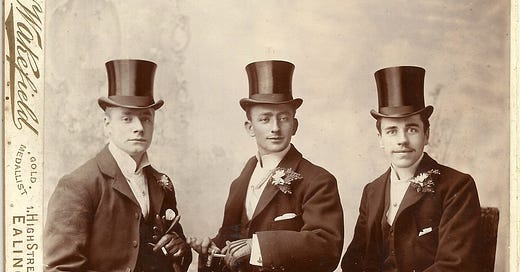Are "luxury beliefs" a real thing?
Sure, many elites are snooty, out-of-touch hypocrites. But what else is new?
I’m kind of intrigued by Rob Henderson’s notion of “luxury beliefs”, and my friend David Marx wrote a post critiquing the idea, so I thought I’d write a post about it too.
I’ve often toyed with the idea that beliefs themselves could be a sort of consumption good. For example, back in 2021 I tweeted:
Really, it’s not the belief that’s the consumption good in this case, but the lifestyle. Consumption goods have a price. Believing in Marxism-Leninism costs you nothing; spending hours a day on social media shouting that Stalin did nothing wrong costs time and effort. But if truly believing in Marxism-Leninism requires you to spend your time and effort in that way, then it’s reasonable to say that the belief itself comes at a price.
And in fact, this sort of ideological crusade probably is a luxury, in the way that economists use the term. In econ, a “luxury” is just something that takes up more and more of people’s spending as they get richer. Rich people do in fact tend to be more ideologically consistent than poor people; if you work full-time to feed your family and do all the housework and child care, there’s less chance that you’ll have hours a day to spend online crusading for Marxism-Leninism, even if you’d join an actual revolution if one came along.
BUT, this is not actually what Rob Henderson means when he uses the term “luxury belief”. It’s not what he means by “luxury”, and it’s not what he means by “belief”. In fact, I sort of just hijacked the term, as well as my own blog post, in order to spout some econ jargon and to make fun of Marxism-Leninism.
Let’s get back on track, shall we?
Henderson defines “luxury beliefs” as “ideas and opinions that confer status on the upper class, while often inflicting costs on the lower classes”. He writes:
Today, when luxury goods are more accessible to ordinary people than ever before, the elite need other ways to broadcast their social position…
Take vocabulary. Your typical working-class American could not tell you what “heteronormative” or “cisgender” means. When someone uses the phrase “cultural appropriation,” what they are really saying is, “I was educated at a top college.” Only the affluent can afford to learn strange vocabulary…
When my classmates at Yale talked about abolishing the police or decriminalizing drugs, they seemed unaware of the attending costs because they were largely insulated from them…A well-heeled student at an elite university can experiment with cocaine and will probably be just fine. A kid from a dysfunctional home with absentee parents is more likely to ride that first hit of meth to self-destruction. This may explain why a 2019 survey…found that more than 60% of Americans with at least a bachelor’s degree were in favor of legalizing drugs, while less than half of Americans without a college degree thought it was a good idea…
Similarly, a 2020 Yahoo News/YouGov survey found that the richest Americans showed the strongest support for defunding the police, while the poorest Americans reported the lowest support. Consider that compared with Americans who earn more than $50,000 a year, the poorest Americans are three times more likely to be victims of robbery, aggravated assault and sexual assault, according to federal statistics. Yet it’s affluent people who are calling to abolish law enforcement.
Most personal to me is the luxury belief that family is unimportant or that children are equally likely to thrive in all family structures.
These all seem to be real phenomena. But I’m not sure that it makes sense to group them all under one single heading of “luxury beliefs”.
Fancy vocabulary, beliefs about personal drug use and marriage, and beliefs about police policy and drug policy are three very different things! They are “beliefs” in three distinct senses of the word. And they all have very different types of costs.
Different kinds of luxuries, different kinds of beliefs
First let’s talk about what it means to “believe” something. (Yes, this is the kind of thing we bloggers like to think about for fun.)
Actually, about a decade ago, on my old blog, I wrote a post exploring different meanings of the word “belief”. I identified two different meanings:
Willingness to bet on an outcome (“I believe the 49ers will win the Super Bowl next year”)
A feeling of truth and rightness when one makes a certain statement (“I believe God is omnipotent”)
Those are demonstrably different things. You can’t actually verify whether God is omnipotent. In fact, you can’t even define it in logical terms. Can God create a rock that He can’t lift? Etc. That’s not something you could place a bet on. When someone says “I believe God is omnipotent”, they don’t mean they’d be willing to bet on it; they mean that saying the statement gives them a feeling of truth and rightness.
Keep reading with a 7-day free trial
Subscribe to Noahpinion to keep reading this post and get 7 days of free access to the full post archives.





